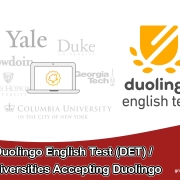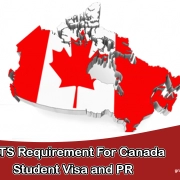Study in Canada without IELTS for international students 2024-2025
Estimated reading time: 13 minutes
Did you know it’s possible to study in Canada without taking the IELTS test? According to the Canadian Embassy, international students with good English skills can now skip the IELTS exam, which can be expensive and unfamiliar. This is a great opportunity to complete your Bachelor’s, Master’s, or Ph.D. while studying abroad. This article will explore various methods for studying in Canada without taking the IELTS exam. But first, let’s look at what IELTS is and how it affects your academic goals for studying in Canada or any other English-speaking country. IELTS stands for International English Language Testing System, one of the most widely used English language tests in the world for higher education and international immigration purposes.
IELTS is a globally recognized English language exam that is accepted by over 11,000 organizations worldwide, including universities, businesses, governments, and professional organizations. It remains the standard method for testing language proficiency and is widely used by the governments of the USA, Australia, Canada, New Zealand, and the UK to process immigration requests. So, if you’re planning to take an English language exam, IELTS is a great option to consider.
If you wish to apply to Canadian universities without having taken the IELTS exam, you must meet or provide certain requirements:
- The applicant should prove that English was the mandatory subject in high school and was already taken. If you also attended an English school, many Canadian institutions will accept you as a student without IELTS (or a similar evaluation), and many of them use a conditional admissions program (CAP).
- Many research-based positions, such as Postdoc and research scientist, don’t require IELTS or other English tests. Therefore, once you find your supervisor and interview him/her, you can apply without taking the IELTS exam.
- If you apply for the graduate level, a letter from your previous university stating that you completed your program in English can be another option by which you can avoid taking the IELTS exam.
- IELTS might not be required if English was the official language in the country where you last received your education. Thus, some institutions in Canada don’t require IELTS from native speakers of the USA, the UK, Australia, or New Zealand.
5-Some universities or colleges might waive the IELTS test for some particular programs. Instead, the English course will be offered at the university, which costs much more than taking the IELTS test.
6-If IELTS exams are difficult, you can try other English tests such as TOEFL, Duolingo, PTE, etc.

Where can I study in Canada without IELTS?
Canadian higher education institutions will accept you without the IELTS score if you attended an English-medium school for four years or longer. The universities in Canada that accept international students without IELTS are listed below:
1-University of Concordia
All applicants to Concordia University must fulfill one of the three criteria listed below to be exempt from taking the English language proficiency test because English is the institution’s primary language of instruction.
1-completion of graduate or undergraduate studies for a minimum of three full years at an accredited university
2-Candidates for the professional programs at the John Molson School of Business can complete a personal interview in addition to having at least five years of full-time job experience in an English-speaking environment.
3-Obtaining a Quebec University degree and a Quebec Diploma of Collegiate Studies (DEC) (evidence of DEC necessary).
2-University of Winnipeg
It is unnecessary to have IELTS certification to enroll at the University of Winnipeg. On the other side, the requirement for English competence is present. Just submit any English language certificate to this university to enroll (including even Duolingo). Before applying or starting your degree, you can enroll in the University of Winnipeg’s exclusive ELP course, an English language course. The official manual provides comprehensive information on the language program exemptions and criteria and is available on the University of Winnipeg’s website.
3-Regina University
To enroll in the Advanced English for Academic Purposes course, international students must pass at least one of the following English language tests:
- TOEFL iBT score of 70 or TOEFL Paper score of 525
- Duolingo 95-105
- CAEL 50
- Academic IELTS 6
4- University of Saskatchewan
University of Saskatchewan, centrally located in Saskatoon, offers the chance for international students to enroll in its courses by requiring an overall TOEFL score of 86 and minimum scores of 19 in each skill. In addition to the CanTEST – Canadian English test for scholars and trainees being accepted, students desiring to enroll in the University of Saskatchewan also have the chance to enroll in the university’s English Language Training course. Given that they both evaluate four sub-skills—listening, reading, writing, and speaking—CanTEST and IELTS can be compared. It also involves a face-to-face speaking test and is not a computerized exam.
5- Memorial University of Newfoundland and Labrador
International students applying to Memorial University of Newfoundland and Labrador must submit grades from their last four years of schooling to prove that they are proficient in English. This university accepts TOEFL result, which needs to be at least 90, and have at least 20 in both Reading and Listening and at least 25 in both Speaking and Writing. CanTEST results require a minimum band score of 4.5 on this university’s writing, reading, and listening skills. The Canadian Academic English Language (CAEL) also calls for a total score of 70, at least 60 in each band, and at least 70 in both speaking and writing.
6-University of Carleton
To enroll in Carleton University without taking the IELTS exam, you need to provide official transcripts for the last three years of your English-language high school, college, or university studies. There are several ways to demonstrate your English proficiency, including:
- Canadian Academic English Language Test, 70
- Pearson Test of English, 60
- TOEFL iBT, 86
7- Cambrian College
Cambrian College will assess students’ English proficiency by not making the IELTS necessary, and those who do not meet the English language requirement will need to take additional English courses before starting their regular program of study.

Steps to study in Canada without IELTS
1-Prepare a list of the universities you are interested in, then evaluate their language requirements. Email the program coordinator if the language eligibility criteria are difficult to find.
2-If the IELTS was not required proof, you could apply for the program online.
3-If you are a graduate-level applicant (Master’s or Ph.D.), you may be contacted for a personal interview after submitting all documents. The interview is primarily for research-based or thesis-based programs.
4-After the result is released, you should prepare your visa documents if you get the acceptance letter. Sometimes, you might pay the university the deposit to ensure they will join the program. Deposit is typically non-refundable.
5-If you have good academic grades and complete all other requirements, you can apply for a study visa in the United States without taking the IELTS exam. However, it is highly recommended that you show the officer that you will be taking an English course at the intended university.
B
Benefits of Studying in Canada without IELTS
If you want to study in Canada as an international student, you must provide evidence of your English language proficiency by taking an English language test, such as the IELTS (International English Language Testing System) or the TOEFL (Test of English as a Foreign Language). However, some Canadian universities and colleges may offer exemptions or alternatives to the language test requirement for certain applicants.
The benefits of studying in Canada without taking the IELTS exam can include:
- Greater accessibility: Not having to take the IELTS exam can make the application process more accessible for students who may face financial, geographic, or other barriers to taking the test.
- More flexibility: Some Canadian universities and colleges may offer alternative language proficiency assessments or waive the language test requirement for students who have completed previous studies in English or who are from countries where English is an official language.
- Time-saving: Skipping the IELTS exam can save you time and money, as you won’t have to prepare for and take the test or pay for test fees and related expenses.
Can I get a conditional offer letter without IELTS in Canada?
Some Canadian universities might give applicants conditional acceptance letters that state that they have been admitted to the college under certain conditions. So, you must meet additional requirements to be eligible for enrollment. This indicates that although the institution views you as a valuable potential addition, they still require additional information or your cooperation before fully accepting you and enrolling you as a student.
Note that not all universities generate this letter; those that do frequently use it to accept international students before they meet certain documentation and language competency standards.
Most students who apply to universities receive conditional or full acceptance letters in the mail or online. These letters include additional information about what you must complete to enroll as a student. The below picture shows what this conditional admission letter looks like.

In conclusion, is it possible to study in Canada without the IELTS exam?
Depending on the university’s standards, YES, it is possible to study in Canada without an IELTS certificate. Don’t forget to check the university’s language admission requirements for other English tests or particular conditions that might help you avoid taking IELTS. Note that since you’ll be learning English, it is reasonable that some proof of English competence is required based on the course you are taking.
Main reasons why students don’t prefer taking IELTS in Canada
In general, many people don’t want to take the IELTS exam because they think it will hinder their chances of getting into a Canadian university. To be more precise, there are four reasons why students frequently decide not to take the IELTS exam:
- Writing short and long essays is part of the IELTS exam structure, which can be difficult for test-takers who lack confidence in their writing abilities.
- It may be scary for some students to pay the $250 application price for the IELTS exam.
- IELTS may require more than one day to finish since the speaking portion with the teacher differs from other parts of the exam.
- Face-to-face testing for the IELTS speaking component can be frightening for some individuals who can experience anxiety when answering questions in person.
Frequently Asked Questions: Study in Canada without IELTS
1-University of Concordia
2-University of Winnipeg
3-Regina University
4- University of Saskatchewan
5- Memorial University of Newfoundland and Labrador
6-University of Carleton
7- Cambrian College
Note that not all universities generate this letter; those that do frequently use it to accept international students before they meet certain documentation and language competency standards.
Depending on the university’s standards, YES, it is possible to study in Canada without an IELTS certificate. Don’t forget to check the university’s language admission requirements for other English tests or particular conditions that might help you avoid taking IELTS. Note that since you’ll be learning English, it is reasonable that some proof of English competence is required based on the course you are taking.
Yes, it is possible, but candidates must gain work experience before applying.
The cost of a Diploma in Canada is about 6-7 k$.
Yes, studying in Canada is possible without taking the IELTS exam. Canadian colleges offer a variety of options to students without IELTS scores. These options include
-Examinations for language competency such as the TOEFL, CanTEST, CAEL, CPE, Cambridge English Exams, PTE, etc.
You might choose the Intensive English Language Program (IELP), offered by several universities, as an alternative to the IELTS in Canada.
-As a substitute for English proficiency tests, provide documentation proving you attended an English-medium school for at least four years.
IELTS scores are not required in Canada for applicants from English-speaking nations.
If you’re worried that your home country’s government won’t recognize your high school diploma as valid in Canada, you can relax because you can apply for admission to a Canadian university with a government-accredited high school diploma.
Universities independently handle academic issues related to curricula, methodologies, and teaching techniques. Universities have the authority to establish academic, admission, and graduation policies and standards, hire faculty and carry out academic planning. On the other hand, private universities are out-of-province institutions permitted to award degrees following a meticulous quality assessment process by the designated governmental authorities that approve certain degrees.
Whether it is an undergraduate or postgraduate program, there are prerequisites that students must meet to be admitted to a Canadian institution of higher learning. The level of competition can change depending on the study area, programs, and other important factors. However, high school grades and performance, as well as language abilities—whether English (in most provinces) or French (in francophone ones)—remain the two key requirements.
You are more than welcome to continue your postgraduate studies in Canada once you have earned a BA degree from a Canadian tertiary institution, and the Canadian government will fully support you in this decision about its immigration laws.
You are more than welcome to continue your postgraduate studies in Canada once you have earned a BA degree from a Canadian tertiary institution, and the Canadian government will fully support you in this decision about its immigration laws.
Most of the time, Ph.D. degree programs are two to three years long, separately funded, and viewed as job positions (not always).
Public universities are commonly independent of governmental monitoring and don’t require accreditation; meanwhile, the state-gathered education council commonly monitors private universities.
Canadian universities and colleges may accept other language proficiency assessments in place of the IELTS, such as the TOEFL, the Pearson Test of English (PTE), or the Cambridge English Qualifications.
The documentation required to demonstrate your English language proficiency without taking the IELTS will vary depending on the institution and program you’re applying to. Some institutions may accept alternative language tests or certifications, such as the TOEFL, PTE, or Cambridge English Qualifications, while others may require that you complete an English language program in Canada or provide transcripts or certificates from previous studies in English.
To obtain a study permit in Canada, you must provide evidence of your English language proficiency, which usually means taking an English language test like the IELTS. However, if you’re exempt from the IELTS requirement, you may still need to provide other documentation to demonstrate your language proficiency to obtain a study permit.
If you plan to work in Canada after graduation, your English language proficiency may be a factor that employers consider. While not taking the IELTS may not necessarily be a barrier to employment, it may be more difficult to demonstrate your language skills to potential employers if you haven’t taken a standardized language test.








I am from Pakistan I done all acedmic education in English medium can i get admission in postgraduate with out ILETS